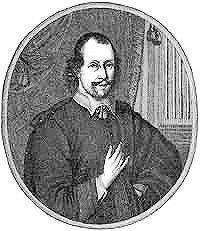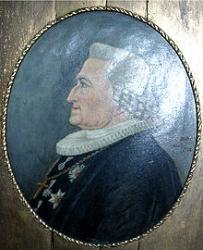
1605 - 1659 Author of "Du foedes maa paany" in Kirkesalmebog Dach, Simon, son of Simon Dach, interpreter to the Court of Justice at Memel, Prussia, was born at Memel, July 29,1605. He attended the Cathedral school at Königsberg, the Town school at Wittenberg, and the Gymnasium at Magdeburg. In 1626 he returned to Königsberg, where, after studying philosophy and theology at the University, he for some time acted as a private tutor. In 1633 he was appointed assistant in the Cathedral school, and in 1636 Conrector. He then, in 1639, became Professor of Poetry in the University, was five times Dean of the Philosophical Faculty, and in 1656-57 Rector of the University. He died at Königsberg, April 15, 1659 (Koch , iii. 182-191; Allg. Deutsche Biog. , iv. 685-688, &c).
Dach was much of an invalid, and nearly broke down under the hard labour and poor pay of his early tutorial work at Königsberg, but found a true friend and generous patron in R. Roberthin (q.v.). In his later years the effects of the Thirty Years' War made themselves visible in Königsberg by depression of trade, famine, &c. In 1648 he lost Roberthin by death, and in 1649 many of his fellow professors fell victims to the pestilence, while during the last year of his life he suffered from a lingering consumption. These facts explain the sombreness of much of his verse. In 1636 he joined in forming the Poetical Union of Konigsberg [see Alberti], and was its poetic soul. He was the most important poet of the Königsberg School, and one of the first lyric poets of his time happy in expression, pure in style, and true hearted. But of the mass of his poems (some 1360 in all, many of which were "occasional" pieces for the Electoral House of Brandenburg, and for private friends) very few retain popularity; the best known being his Aennchen von Tharaw.
Dach's hymns, some 165 in all, appeared in broadsheet form, in H. Alberti's Arien, 1638-1650, and in the Königsberg Hymnbooks, 1639-1690. They deservedly place him amongst the best hymn writers of his time, and win him the distinction of being one of the most lovable, most profound and most elegant of the more contemplative hymn writers. Their personal and subjective character, and the fact that so many are hymns of preparation for death, have prevented all but a few from finding a place in modern hymnals.
Five of Dach's hymns have passed into English, all of which are included in the complete edition of his Werke by Hermann Oesterley, published at Tübingen, 1876. They are:—
i. Ich steh in Angst und Pein. [Second Advent.] The Königsberg University Library possesses a broadsheet, printed at Elbing, 1642, as a Christliches Trauer-Lied to Christoph Behm, on the death, on Nov. 22, 1633, of his son Christoph, a student of theology. It was included in pt. iv., Königsberg, 1641, of H. Alberti's Arien, No. 5, in 10 stanza of 6 1., entitled " Supremi Judicis urnam non metuit fisus sanguine, Christe, tuo." Repeated in Oesterley, p. 91, as No. 1421 in the Leipzig Vorrath, 1673, and, omitting stanza viii., in the Wittenberg G. B., 1742-1866, No. 893. The only translation in C. U. is :—
A dread hath come on me, a good translation, omitting stanza viii., as No. 28 in Miss Winkworth's Chorale Book for England, 1863.
ii. Kein Christ soil ihm die Rechnung machen. [Cross and Consolation."] 1st published in pt. ii., Königsberg, 1640, of H. Alberti's Arien, No. 1, in 7 stanzas of 6 lines, entitled "Non caret adversis, qui pius esse velit." Included in Oesterley , p. 108, and as No. 631 in the Unv. L. S., 1851. The form translated into English is of stanza ii., iii., vii., beginning, "Wer dort mit Christo hofft zu erben," which is No. 812 in Bunsen's Versuch, 1833. The only translation in common use is:—
Wouldst thou inherit life with Christ on high? A good tr. from Bunsen, by Miss Winkworth, in her Lyra Ger., 1st Ser., 1855, p. 129, and thence unaltered as No. 170 in the New Zealand Hymnal , 1872. In Sacred Lyrics from the German, Philadelphia, 1859, p. 61, it begins "Couldst thou inherit."
iii. 0 wie selig seid ihr dooh, ihr Frommen . [Eternal Life.] The original broadsheet, printed at Danzig, 1635, with music by J. Stobaus, as the Musikalisches Ehrengedächtniss of Hiob Lepner, Burgomaster of the Königsberg Altstadt, who died May 9, 1635, is in the Königsberg University Library. Included in B. Derschau's G. B., Königsberg, 1639, p. 73, in 6 stanza of 4 1., repeated in Oesterley, p. 95 ; the Leipzig Vorrath, 1673, No. 1460; in Burg's G. B., Breslau, 1746, No. 1086; and many others. It is a fine hymn, founded on Rev. xiv., 13-14. Lauxmann, in Koch, viii. 673, relates that J. A. Hochstetter, Prelate of Bebenhausen, near Tubingen (d. 1720), in July, 1719, summoned his household to accompany him in visiting the family burial place in the Church, and there pointed out his resting place, spoke to them of eternal life, and ended by requesting them to ;ing this hymn, and also "Christus der ist meiu Leben" (q.v.). The only tr. in C. U. is :—
0 how blest are ye beyond our telling, a good and full translation, as No. 197 in Miss Winkworth's C. B. for England, 1863.
Other translations are, (l) "O, how blest are ye whose toils are ended," by H. W. Longfellow (1846 or earlier). P. Works, Routledge, 1879, p. 648. (2) "Oh! how blessed are ye, saints forgiven," by Miss Borthwick in H. L. L., 1854, p. 32 (1884, p. 35). This is from the double form in the Berlin G. B.t 1711, No. 655, which has six stanzas to be sung alternately with Dach's stanzas by the choir as the answer of the Blessed Ones; with two concluding stanza to be sung by choir and congregation together. These eight additional st. are by Jacob Baumgarten (b. 1668, d. 1722), and begin: "Ja, höchst selig sind wir, lieben Brüder; (3) "O how blessed, faithful souls are ye," by Miss Winkworth, 1855, p. 252; (4) "How bless’d the saints; who, dying here," by Dr. G. Walker, 1860, p. 114. It may be noted that the hymn beginning, “O how blest the throng who now adoring," by A. T. Russell, in 4 stanza as No. 266 in his Ps. & Hys., 1851, while not a translation, is yet based on this hymn by Dach.
In addition the following hymns by Dach have been translated into English :—
iv. Nimm dich, o meine Seel' in Acht [ Treasures in Heaven.'] 1st published as No. 5 in pt. vii. Königsberg, 1648, of H. Alberti's Arien, in 10 stanza of 4 1., entitled, " As the noble Rottger von Tieffenbrock, a native of Livonia, departed this world at Königsberg in Prussia the 3lst May, 1648," with the motto—
"Das ewige Gut
Macht rechten Muth."
Included by Oesterley, p. 208, and as No. 1762 in Knapp's Ev. L. S., 1837 (1865 No. 1668). The translations are, (1) "My soul, let this your thoughts employ," by Miss Cox, 1841, p. 133; (2) " Think, O my soul, that whilst thou art," by Lady E. Fortescue, 1843 (1847, p. 62); (3) “Beware, O man, lest endless life," by Dr. H. Mills, 1845.
v. Schöner Himmelssaal. [Heaven.] A beautiful hymn of homesickness for the heavenly country. Oesterley, p. 222, gives it as "On the death of Ursula Vogt, wife of Pastor Jacob Bollius, Oct. 30, 1655. Its composition was requested on June 3, 1649." The original broadsheet, with music by H. Alberti, as her Christliches Sterbelied, is in the Königsberg University Library. It did not appear in the Königsberg G. B., 1657, but in the ed. of 1675 [Berlin] it is No. 496 (ed. 1690, No. 500), in 9 st. of 6 1. In the Unv. L. S., 1851, No. 637. It is translated as "O ye Halls of Heaven," by Miss Winkworth, 1869, p. 185. [Rev. James Mearns, M.A.]
-- John Julian, Dictionary of Hymnology (1907)
=====================
Dach, Simon, p. 277, ii., line 14. Longfellow's translation is in his Poets and Poetry of Europe, 1815, p. 240.
--John Julian, Dictionary of Hymnology, Appendix, Part II (1907)
Simon Dach

